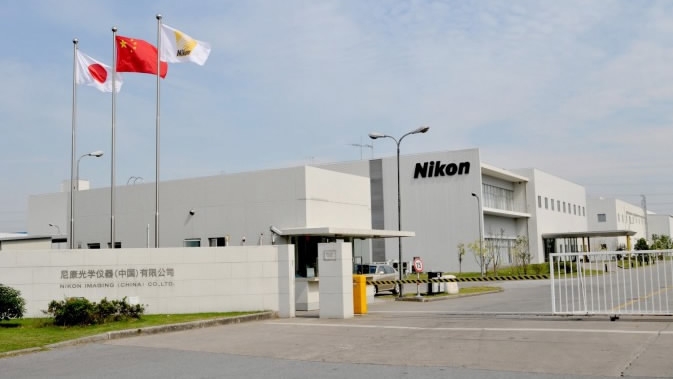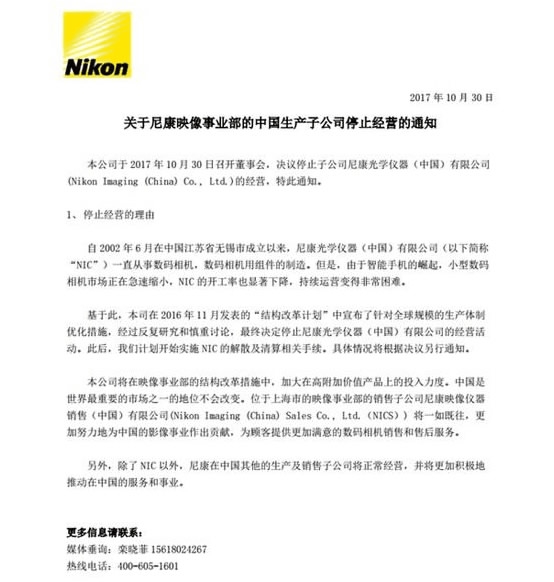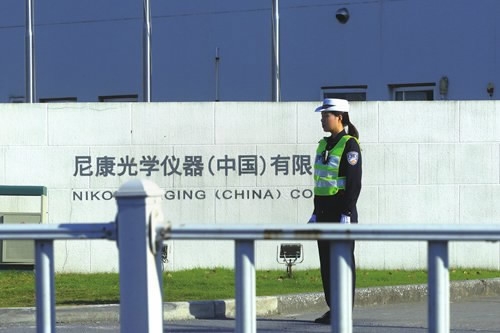
Business
14:38, 31-Oct-2017
Have smartphones killed serious cameras? Nikon closes China factory
CGTN

Japanese camera maker Nikon on Monday announced the closure of one of its Chinese subsidiary factories, Nikon Imaging (China) Co. (NIC).

Nikon's official announcement discontinuing operation of NIC.
Nikon's official announcement discontinuing operation of NIC.
NIC was established in the eastern Chinese city of Wuxi on June 14, 2002. It was designed for manufacturing digital cameras and interchangeable lens units for digital cameras. As of the end of September, the factory had 2,285 employees.

Photo via Fotomen
Photo via Fotomen
In an online statement, Nikon said the subsidiary was closed as the market had been squeezed by smartphones.
Due to the rise of smartphones, the compact digital camera market has been shrinking rapidly, leading to a significant decrease in operating rate at NIC and creating a difficult business environment, Nikon said.
The withdrawal leaves a big question mark about digital cameras’ future in China, if not worldwide. Nikon has consistently taken a 30-percent share of the digital camera market in China, and has never fallen out of the top three in battling Canon and Sony, according to multiple researchers and data providers including Beijing’s ZDC Internet Consumption Study Center.
Photographer Sven Skafisk took Camera & Imaging Products Association data and created a chart showing how sales of D-SLR and mirrorless cameras have been battered by smartphones, even though we are in a golden age in terms of the popularity of photography.

Illustration by CIPA/Sven Skafisk via PetaPixel
Illustration by CIPA/Sven Skafisk via PetaPixel
"Literally 98.4 percent of the consumer cameras sold in 2016 were built into smartphones – only 0.8 percent were compacts, 0.5 percent D-SLRs and 0.2 percent mirrorless," said Skafisk.
Nikon’s sales slide reflects the declining market for serious cameras overall, as global demand for compact digital models has shrunk to a tenth of its peak within a decade, Japan’s Nikkei newspaper suggested.

Picture via Internet
Picture via Internet
Nikon will now begin conducting dissolution and liquidation procedures over NIC, and transfer part its production to other plants including a factory in Thailand. The closure of this Chinese plant would affect about 2,300 workers, at some 7 billion Japanese yen (62 million US dollars) in costs, according to Kyodo News International.

Picture via Internet
Picture via Internet
China’s position as one of Nikon’s most important markets in the world remains unchanged, as the brand decided to place more focus more on high value-added products. Another Nikon subsidiary in China, Nikon Imaging (China) Sales Co. (NICS) which handles marketing and sales-relevant services, was spared from direct impact and will continue its full operations.
(Source: Agencies)

SITEMAP
Copyright © 2018 CGTN. Beijing ICP prepared NO.16065310-3
Copyright © 2018 CGTN. Beijing ICP prepared NO.16065310-3